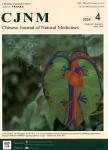Discovery of proqodine A derivatives with antitumor activity targeting NAD(P)H:quinone oxidoreductase 1 and nicotinamide phosphoribosyltransferase
作者机构:State Key Laboratory of Natural MedicinesKey Lab of Drug Metabolism and PharmacokineticsChina Pharmaceutical UniversityNanjing 210009China State Key Laboratory of Natural MedicinesChina Pharmaceutical UniversityNanjing 210009China
出 版 物:《Chinese Journal of Natural Medicines》 (中国天然药物(英文版))
年 卷 期:2024年第22卷第1期
页 面:75-88页
核心收录:
学科分类:1008[医学-中药学(可授医学、理学学位)] 1007[医学-药学(可授医学、理学学位)] 1006[医学-中西医结合] 100706[医学-药理学] 100602[医学-中西医结合临床] 10[医学]
基 金:This work was supported by the National Key Research and Development Programme of China(No.YFA1303800) the Fundamental Research Funds for the Central Universities(No.2632023TD10) the National Natural Science Foundation of China(No.81930109)
摘 要:NAD(P)H:quinone oxidoreductase 1(NQO1)is a flavin protease highly expressed in various cancer ***1 catalyzes a futile redox cycle in substrates,leading to substantial reactive oxygen species(ROS)*** ROS generation results in extensive DNA damage and elevated poly(ADP-ribose)polymerase 1(PARP1)-mediated consumption of nicotinamide adenine dinucleotide(NAD^(+)),ultimately causing cell *** phosphoribosyltransferase(NAMPT),the rate-limiting enzyme in the NAD^(+)salvage synthesis pathway,emerges as a critical target in cancer *** concurrent inhibition of NQO1 and NAMPT triggers hyperactivation of PARP1 and intensive NAD+*** this study,we designed,synthesized,and assessed a novel series of proqodine A derivatives targeting both NQO1 and *** these,compound T8 demonstrated potent antitumor ***,T8 selectively inhibited the proliferation of MCF-7 cells and induced apoptosis through mechanisms dependent on both NQO1 and *** discovery offers a promising new molecular entity for advancing anticancer research.



